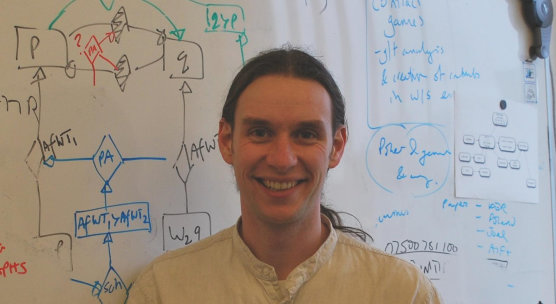£1.1million AI grant to mine arguments and analyse opinion
Published On Tue 29 Sep 2015 by Grant Hill

University of Dundee researchers are to bring the work of ancient Greek and Roman scholars together with cutting-edge technology to solve an Artificial Intelligence challenge that offers potentially huge benefits for stock market analysts, academics, the PR industry and political parties.
They have been awarded funding for a project worth more than £1.1million by the Engineering and Physical Sciences Research Council (EPSRC) to develop new tools to carry out argument mining, a relatively new field of AI and one regarded as having exceptional academic, commercial and cultural potential. They will work with IBM and other partners to bring the technology to fruition by the end of 2019.
AI algorithms already process millions of newspaper articles to determine public sentiment in order to predict financial markets. They transform the torrent of social media into reports for marketing departments, summarising what customers say about a company's (or a competitor's) product. But these techniques only give information about what opinions people hold – not why they hold them.
Though argument technology, in which the UK is a world leader, has had applications in domains as diverse as healthcare, public policy, government and the media, the focus has been squarely upon technologies for supporting human argumentation and subsequent automated reasoning with the results.
Arguments made outside such software-walled gardens have been off the agenda simply because automatic machine understanding of unfettered naturally occurring reasoning has been too hard to tackle.
The concerted efforts of a small number of researchers across the world, including those at the University’s Centre for Argument Technology, have moved the field on to the point that the Dundee team now believe the ESPRC grant will enable them to develop algorithms for automatically extracting the structure of human reasoning from documents and web pages.
“Understanding the why has the potential to unlock huge new markets but until very recently this was just too tough for AI to crack,” explained Professor Chris Reed, Head of the Centre for Argument Technology.
“Until about two years ago argument mining was firmly beyond state-of-the-art but the last eighteen months have seen dozens of AI labs around the world gearing up to tackle the problem. The competition is intense, but this new investment from EPSRC puts the UK at the very forefront of this exciting new area.
“Opinion mining has transformed the way that market research and PR is carried out, deploying big data analysis techniques to understand the attitudes people hold towards products and brands. Sentiment analysis has had an even greater impact in predicting financial markets by analysing broad moods and perspectives that are expressed in the press.
“Argument mining is the natural evolution of these technologies, providing a step change in the level of detail available – moving from not just analysing what opinions people hold, but to why they hold the opinions they do. It has immense potential for computer understanding of human reasoning.”
The algorithm that Professor Reed and his colleagues are aiming to develop will identify the argumentative structures in digital texts using the techniques deployed by classical Greek and Roman philosophers such as Aristotle and Cicero. By doing this they will transform bare, statistically driven approaches with detailed theories of structure which can act to define expectations in a way that constrains the machine learning task thereby improving accuracy and applicability.
Professor Reed continued, “Our theories of how argument is structured go back to Ancient Greece. In the past thirty years or so, the computational sciences have started to build models and engineer software based on these theories: this is the field of argument technology, and the recent surge in activity is testament to the vitality and broad applicability of the field.
“Argument and debate form cornerstones of civilised society and of intellectual life. Processes of argumentation run our governments, structure scientific endeavour and frame religious belief. Recognising and understanding argument are central to decision-making and professional activity in all walks of life. It is why such a premium is placed upon these skills and why rationality is one of the very defining notions of what it is to be human.
“We are particularly pleased to be working on this project with several companies including IBM, whose cognitive computing platform, Watson, may provide us with an ideal way of deploying argument mining techniques to real-world problems.”
Notes to editors:
The Engineering and Physical Sciences Research Council (EPSRC)
As the main funding agency for engineering and physical sciences research, our vision is for the UK to be the best place in the world to Research, Discover and Innovate.
By investing £800 million a year in research and postgraduate training, we are building the knowledge and skills base needed to address the scientific and technological challenges facing the nation. Our portfolio covers a vast range of fields from healthcare technologies to structural engineering, manufacturing to mathematics, advanced materials to chemistry. The research we fund has impact across all sectors. It provides a platform for future economic development in the UK and improvements for everyone’s health, lifestyle and culture.
We work collectively with our partners and other Research Councils on issues of common concern via Research Councils UK. www.epsrc.ac.uk
For media enquiries contact:
Grant Hill
Press Officer
University of Dundee
Nethergate, Dundee, DD1 4HN
TEL: 01382 384768
E-MAIL: g.hill@dundee.ac.uk
MOBILE: 07854 953277